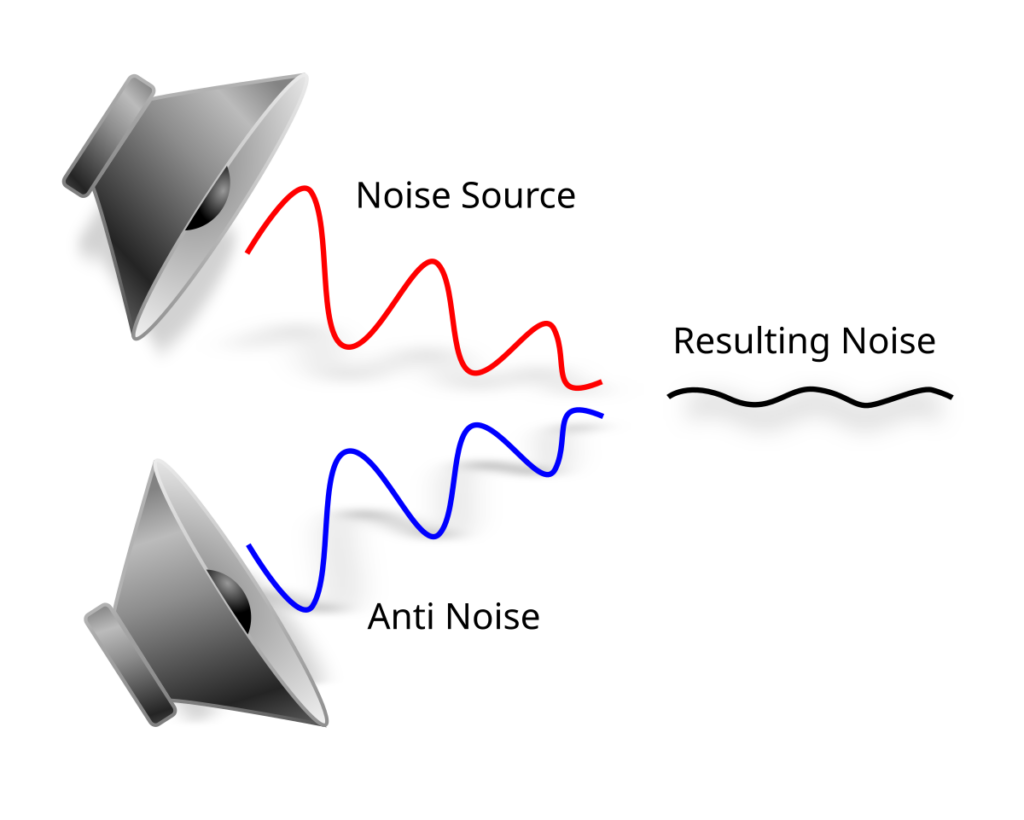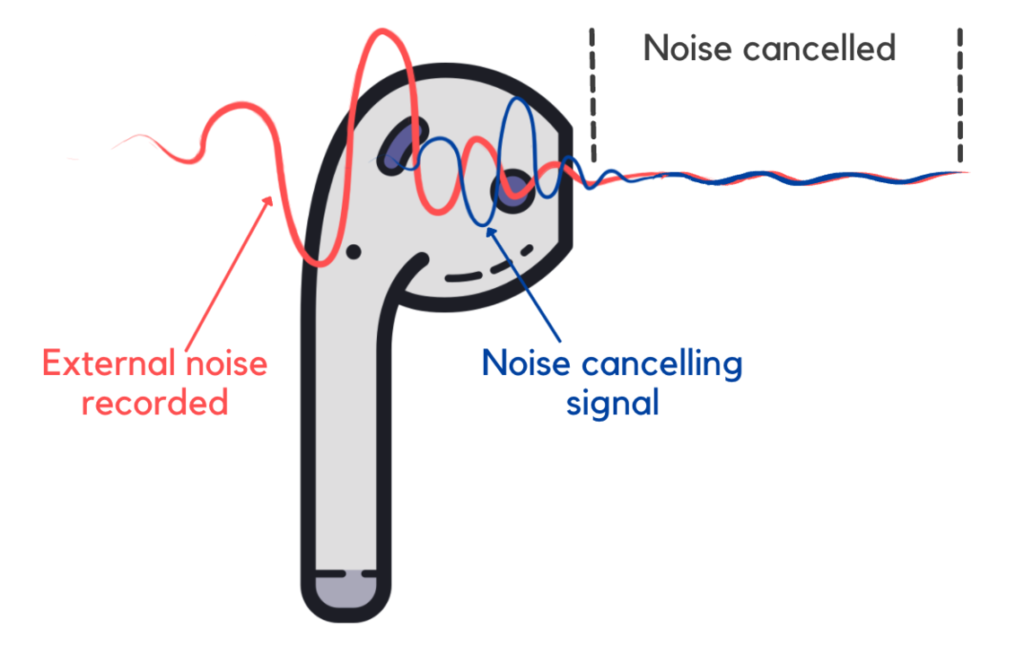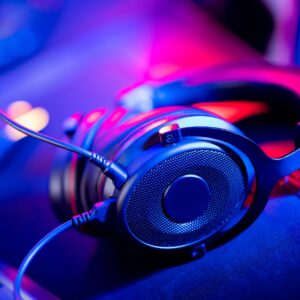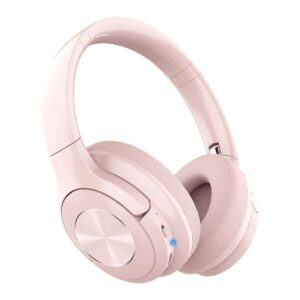Active Noise Cancellation (ANC) reduces unwanted ambient sounds using active sound control. It enhances the listening experience by minimizing background noise.
Active Noise Cancellation technology uses microphones and speakers to detect and counteract external noise. It works by emitting sound waves that neutralize incoming noise, creating a quieter environment.
ANC is essential for headphones and earbuds, offering superior audio clarity. Ideal for commuters, travelers, and office workers, ANC helps maintain focus and relaxation. This technology has evolved to provide better performance in various noise conditions.
Modern ANC devices are more efficient and user-friendly, making them popular in consumer electronics. Investing in ANC-equipped products can significantly improve your audio experience and overall comfort.
Introduction To Active Noise Cancellation
Active Noise Cancellation (ANC) technology is revolutionizing how we experience sound. This cutting-edge technology reduces unwanted ambient sounds. Imagine enjoying your favorite music without background noise. ANC makes this possible by creating a serene audio experience.
The Concept Of Silence In Sound
Silence is not just the absence of sound. It is an active process that enhances listening experiences. ANC uses microphones and speakers to create silence. These tools generate sound waves that cancel out noise. The result is a quieter environment even in noisy places.
Brief History Of ANC Technology
ANC technology has an interesting history. It started in the 1950s. Dr. Lawrence Fogel was one of the pioneers. He developed noise-canceling systems for pilots. These early systems were bulky and expensive.
In the 1980s, Dr. Amar Bose improved the technology. He made it more affordable and practical for consumers. Today, ANC is used on many devices like headphones and earbuds.
| Year | Milestone |
|---|---|
| 1950s | Initial development by Dr. Lawrence Fogel |
| 1980s | Improvement and commercialization by Dr. Amar Bose |
| 2000s | Integration into consumer electronics |
ANC technology has continuously evolved. Today, it is more efficient and accessible. It is now a staple feature in high-quality audio devices. This technology allows users to enjoy pure sound.

Credit: en.wikipedia.org
How Active Noise Cancellation Works
Active Noise Cancellation (ANC) is a technology that reduces unwanted sound. It helps create a quiet space, even in noisy environments. Understanding how ANC works can be fascinating.
The Science Behind Noise Cancellation
ANC uses microphones to capture ambient noise. These microphones are usually placed on the ear cups of headphones.
A special chip then processes the captured noise. The chip generates an anti-noise signal. This signal is the exact opposite of the captured noise. When the two signals meet, they cancel each other out.
This process is called destructive interference. It makes the unwanted noise less noticeable. The result is a quieter and more peaceful listening experience.
Different Types Of Noise Cancellation
There are several types of noise cancellation methods:
- Passive Noise Cancellation: This method uses materials to block noise. Ear cups made of thick padding are common.
- Active Noise Cancellation: This method uses microphones and anti-noise signals. It is more effective at reducing low-frequency sounds.
- Adaptive Noise Cancellation: This method adjusts the level of cancellation based on the environment. It provides a more personalized experience.
Here’s a simple comparison:
| Type | Description |
|---|---|
| Passive Noise Cancellation | Uses physical barriers to block sound. |
| Active Noise Cancellation | Uses technology to cancel out noise. |
| Adaptive Noise Cancellation | Adjusts based on the environment. |
Components Of Active Noise Cancellation Systems
Active Noise Cancellation (ANC) systems are complex. They consist of various components working together. Understanding these parts helps in appreciating how ANC works.
Microphones And Their Role
Microphones are crucial in ANC systems. They detect external sounds. Usually, there are two types of microphones in ANC systems:
- Feedforward microphones: These are placed outside the ear cup. They pick up ambient noise before it reaches your ears.
- Feedback microphones: These are inside the ear cup. They capture any noise that sneaks past the feedforward microphones.
Both microphones work together. They ensure the ANC system can react to external noise effectively.
Sound Processors And Algorithms
Sound processors are the brains of ANC systems. They analyze the noise captured by the microphones. The processors use complex algorithms to create an anti-noise signal.
These algorithms are sophisticated. They calculate the phase and amplitude of the external noise. Then, they generate a sound wave that cancels out the noise. The result is a quieter listening experience.
Speakers And Ear Cups
Speakers are the final piece in the ANC puzzle. They play the anti-noise signal created by the sound processors.
The design of the ear cups also plays a role. They help in passively blocking some of the external noise. This makes the job of the ANC system easier.
| Component | Function |
|---|---|
| Microphones | Capture external noise |
| Sound Processors | Analyze and create anti-noise signal |
| Speakers | Play anti-noise signal |
| Ear Cups | Block some external noise passively |
All these components work in harmony. They provide an effective noise-canceling experience. The technology behind ANC is truly fascinating.
Benefits Of Active Noise Cancellation
Active Noise Cancellation (ANC) technology offers many advantages. It improves sound quality, boosts health, and enhances productivity. Learn how ANC can change your daily life.
Enhanced Listening Experience
ANC enhances your listening experience by reducing unwanted background noise. This technology blocks out ambient sounds, letting you enjoy your music or calls better. Here are some key features:
- Clearer sound quality
- Better music immersion
- Improved voice call clarity
Health And Well-being Advantages
ANC can have positive effects on your health. Constant noise can be stressful and tiring. ANC helps reduce this stress. Here are some health benefits:
| Health Benefit | Description |
|---|---|
| Reduced Stress | Lower noise levels help reduce stress and anxiety. |
| Better Sleep | Quiet environments help you sleep better at night. |
| Improved Focus | Less noise helps you concentrate better on tasks. |
Productivity Boost In Noisy Environments
ANC can greatly improve productivity in noisy settings. It helps block out distractions, allowing you to focus better. Benefits include:
- Enhanced concentration on tasks.
- Faster completion of work.
- Improved accuracy in tasks.
Using ANC headphones in busy offices or during travel can be a game-changer.
Popular Applications Of Active Noise Cancellation
Active Noise Cancellation (ANC) has revolutionized how we experience sound. It cancels unwanted noise, providing a quieter environment. Let’s explore its popular applications.
Consumer Electronics
ANC technology is widely used in consumer electronics. Headphones and earbuds are the most common examples. These devices use ANC to block out background noise. This allows users to enjoy music without disturbance.
Smartphones and laptops also benefit from ANC. They use it to enhance voice clarity during calls. This makes communication clearer and more effective. Gaming headsets also use ANC for an immersive experience.
Here’s a table showing popular ANC devices:
| Device | Brand | Usage |
|---|---|---|
| Headphones | Sony, Bose | Music Listening |
| Earbuds | Apple, Samsung | Music & Calls |
| Gaming Headsets | Razer, SteelSeries | Gaming |
Automotive Industry
The automotive industry has embraced ANC technology. Cars use ANC to reduce engine and road noise. This creates a quieter cabin. Passengers can enjoy a more peaceful ride. Luxury vehicles often feature advanced ANC systems.
These systems enhance the driving experience. Trucks and buses also use ANC. They offer a quieter environment for long journeys.
Key benefits of ANC in vehicles:
- Quieter cabin
- Enhanced driving experience
- Reduced driver fatigue
Workplace And Industrial Settings
ANC is crucial in the workplace and industrial settings. It helps reduce noise in offices and factories. This improves concentration and productivity. Construction sites use ANC to protect workers’ hearing. Manufacturing plants also benefit from ANC.
It helps create a safer work environment. Call centers use ANC-enabled headsets. This ensures clear communication between employees and clients.
Applications of ANC in workplaces:
- Reducing office noise
- Protecting workers’ hearing
- Ensuring clear communication
The Evolution Of Active Noise Cancellation Technology
Active Noise Cancellation (ANC) has changed how we hear sound. This technology blocks unwanted noise. It creates a peaceful audio experience. Let’s explore how ANC has evolved.
From Wired To Wireless
Early ANC headphones used wires. They were bulky and less convenient. Today, most ANC headphones are wireless. This change makes them user-friendly. Bluetooth technology plays a big role in this shift.
Improvements In Battery Life
Battery life was a major issue in early ANC devices. Users had to charge them frequently. Now, battery life has improved greatly. Some models offer up to 40 hours of playback. Longer battery life means more uninterrupted listening.
Integration With Smart Devices
Modern ANC headphones can connect to smart devices. They work with phones, tablets, and even smartwatches. This integration makes controlling your music easier. Voice assistants like Siri and Alexa enhance the user experience.
Challenges And Limitations
Active Noise Cancellation (ANC) is a powerful technology. It helps reduce unwanted noise. But it has some challenges and limitations. Understanding these can help you make the best use of ANC headphones.
Limitations In Noise Frequency
ANC works well with low-frequency sounds. These include engine noise and background hum. High-frequency sounds, like human voices, are harder to cancel. This is due to the shorter wavelengths. ANC systems struggle to detect and cancel these sounds.
Therefore, you may still hear people talking or other sharp sounds.
Active Noise Cancellation In Windy Conditions
Wind can be a big problem for ANC. Wind noise can interfere with the microphones, causing the ANC system to malfunction. The result is often a crackling sound.
Some headphones have wind-noise reduction features, but these are not always effective. You may need to turn off ANC in very windy conditions.
Balancing Sound Quality With Noise Cancellation
ANC can sometimes affect sound quality. The technology uses microphones to pick up noise. It then creates anti-noise to cancel it. This process can alter the music or audio you are listening to. Some people feel the sound becomes less clear.
High-end ANC headphones try to balance both. They aim to provide good noise cancellation and sound quality.
| Challenge | Description |
|---|---|
| Noise Frequency | Effective with low-frequency sounds, struggles with high-frequency sounds. |
| Windy Conditions | Wind can interfere with microphones, causing malfunction. |
| Sound Quality | ANC may alter the sound, affecting clarity and quality. |
The Future Of Active Noise Cancellation
Active Noise Cancellation (ANC) has changed how we hear sounds. As technology grows, ANC is set to become even better. Let’s explore the future of ANC.
Advancements On The Horizon
The future holds many advancements for ANC. Smaller components will make headphones lighter. Better battery life will keep ANC running longer. Improved sound quality will make music and calls clearer.
| Advancement | Benefit |
|---|---|
| Smaller components | Lighter headphones |
| Better battery life | Longer use |
| Improved sound quality | Clearer audio |
Potential New Use-cases
ANC is not just for headphones. Homes and offices can use ANC for quiet spaces. Cars can use ANC to reduce road noise. Hospitals can use ANC for peaceful environments.
- Homes and offices
- Cars
- Hospitals
The Role Of AI In Active Noise Cancellation Development
Artificial Intelligence (AI) is the key to ANC’s future. AI can learn from sounds and improve noise cancellation, predicting noise and canceling it before you hear it. This will make ANC smarter and more efficient.
- AI learns from sounds
- It improves noise cancellation
- AI predicts and cancels noise
Choosing The Right Active Noise Cancellation Device
Selecting the best Active Noise Cancellation (ANC) device can be tricky. There are many options, each with different features and specifications. This section will help you find the perfect ANC device for your needs.
Key Features To Look For
Noise Cancellation Levels: Check the levels of noise cancellation. Some devices offer multiple settings for different environments.
Battery Life: Look for long battery life. This ensures your device lasts through long trips or workdays.
Comfort and Fit: Comfort is crucial. Choose a device that fits well and feels comfortable for extended use.
Sound Quality: Ensure the device offers excellent sound quality. Clear and crisp audio is a must.
Understanding Specifications
| Specification | Details |
|---|---|
| Frequency Response | Check the range for better sound quality. |
| Bluetooth Version | Higher versions offer better connectivity and range. |
| Impedance | Lower impedance works better with portable devices. |
| Weight | Lighter devices are more comfortable for long use. |
Price Versus Performance
Budget: Set a budget before shopping. Prices range widely, so know your limit.
Value for Money: Compare features against the price. More expensive does not always mean better.
Reviews and Ratings: Read user reviews. They provide real-world insights into performance and durability.
Maintaining Your Active Noise Cancellation Device
Active Noise Cancellation (ANC) devices are a marvel of modern technology. They provide an immersive audio experience by blocking unwanted sounds. To keep your ANC device in top condition, regular maintenance is crucial.
Below are some essential tips and tricks to help you maintain your ANC device.
Cleaning And Care Tips
Cleaning your ANC device is important to ensure longevity. Use a soft, dry cloth to wipe the exterior. Avoid using any harsh chemicals, as they can damage the device.
- Remove ear tips and clean them separately.
- Use a cotton swab for small crevices.
- Store the device in a protective case.
Keeping your ANC device clean will help it function better and last longer.
Troubleshooting Common Issues
Troubleshooting common issues can save time and money. Here are some quick fixes:
- No Sound: Check if the device is charged.
- Static Noise: Ensure a strong Bluetooth connection.
- Uneven Sound: Clean the ear tips and speakers.
If these tips don’t work, consult the user manual or contact customer support.
Software Updates And Upgrades
Software updates can enhance the performance of your ANC device. Always keep the firmware up-to-date. Check the manufacturer’s website for the latest updates.
- Download the update file.
- Follow the installation instructions.
- Restart the device to complete the update.
Regular updates ensure your ANC device performs optimally.
Conclusion: The Quiet Revolution
Active Noise Cancellation (ANC) has changed how we experience sound. This technology creates a quieter and more focused environment. Let’s dive into the impact and personal experiences with ANC.
Summarizing The Impact Of Active Noise Cancellation
ANC technology has brought significant changes to our daily lives. It helps in reducing unwanted noise, allowing us to enjoy clearer audio. Here are some key benefits:
- Enhanced Concentration: Helps in focusing on work or study by blocking distractions.
- Improved Sleep Quality: Reduces background noise for a peaceful sleep.
- Better Travel Experience: Minimizes engine noise during flights or train journeys.
- Health Benefits: Reduces stress and improves mental well-being.
Personal Experiences With Active Noise Cancellation
Many users have shared their positive experiences with ANC. Here are some common scenarios:
- Office Workers: Feel more productive with fewer distractions.
- Students: Report better focus during study sessions.
- Travelers: Enjoy quieter flights and train rides.
- Parents: Find it easier to relax and unwind at home.
These experiences highlight the practical benefits of ANC in everyday life. The technology has truly sparked a quiet revolution.

Credit: www.linkedin.com
Frequently Asked Questions
What Is The Difference Between ANC And Active Noise Cancellation?
ANC stands for Active Noise Cancellation. They are the same technology, designed to reduce unwanted ambient sounds.
How Does Active Noise Cancelling ANC Work?
Active noise canceling (ANC) uses microphones to detect external sounds. It then creates inverse sound waves to cancel them out. This reduces unwanted background noise, enhancing audio clarity and listening experience.
What Is Active Noise Control ANC Technology?
Active Noise Control (ANC) technology reduces unwanted sound by emitting opposing sound waves. It enhances listening experiences, especially in headphones.
Is ANC Good For Your Ears?
ANC (Active Noise Cancelling) is generally safe for your ears. It reduces external noise, allowing lower volume levels. Always use headphones responsibly to avoid hearing damage.
What Is Active Noise Cancellation?
Active Noise Cancellation (ANC) reduces unwanted background sounds using advanced technology.
How Does ANC Work?
ANC uses microphones and speakers to counteract external noises with anti-noise sound waves.
Is ANC Safe For Daily Use?
Yes, ANC is safe for daily use and poses no health risks.
Does ANC Affect Sound Quality?
ANC can enhance sound quality by eliminating distracting background noise.
Conclusion
Active Noise Cancellation (ANC) technology significantly improves listening experiences. It blocks unwanted sounds, enhancing audio clarity. Investing in ANC headphones can transform your daily routines.
Enjoy peaceful commutes, focused work sessions, and immersive entertainment. Stay ahead with the latest ANC advancements and elevate your auditory experience.

A passionate tech blogger and the founder of Best Tech View, a dynamic platform dedicated to all things technology. With a keen interest in the tech, Ahmad strives to provide insightful and engaging content on the latest tech trends, and breakthroughs.


